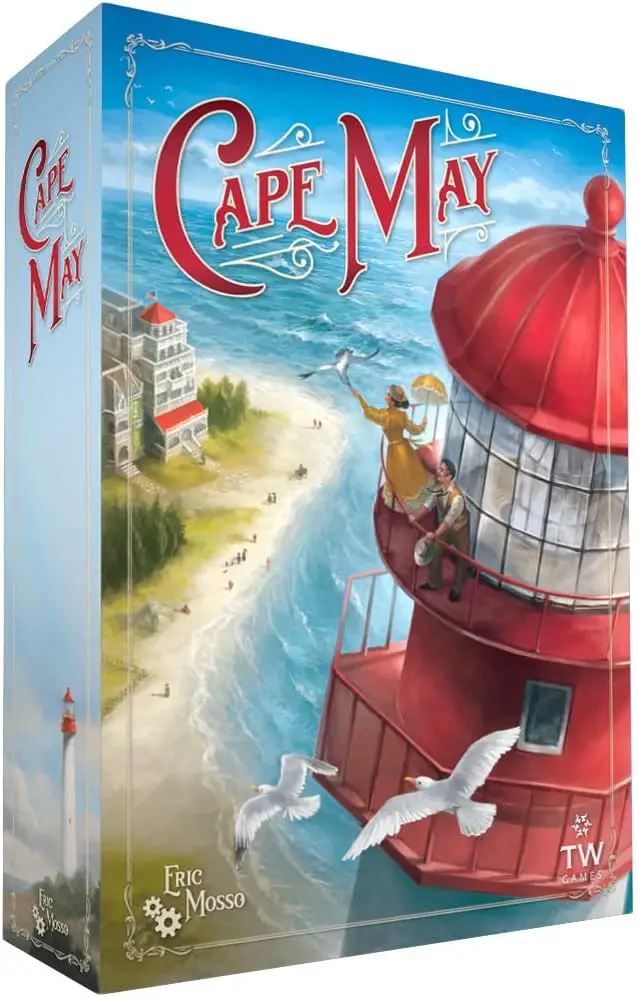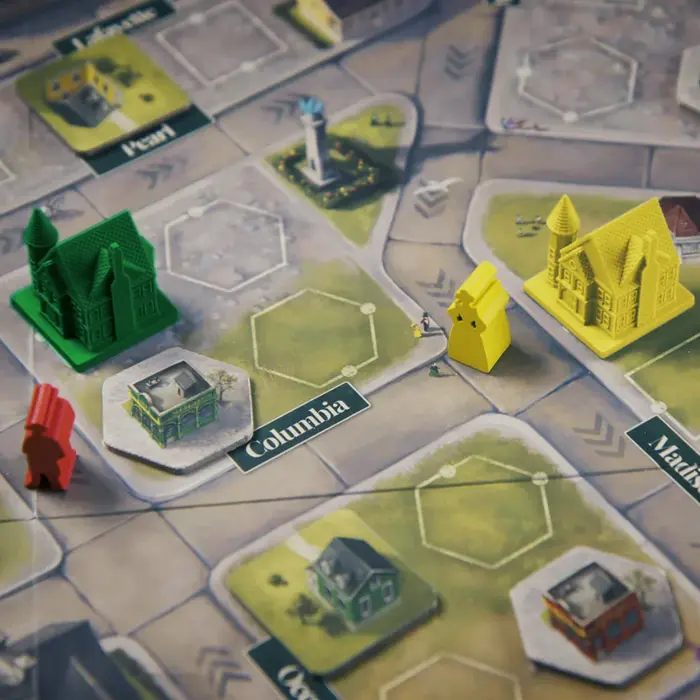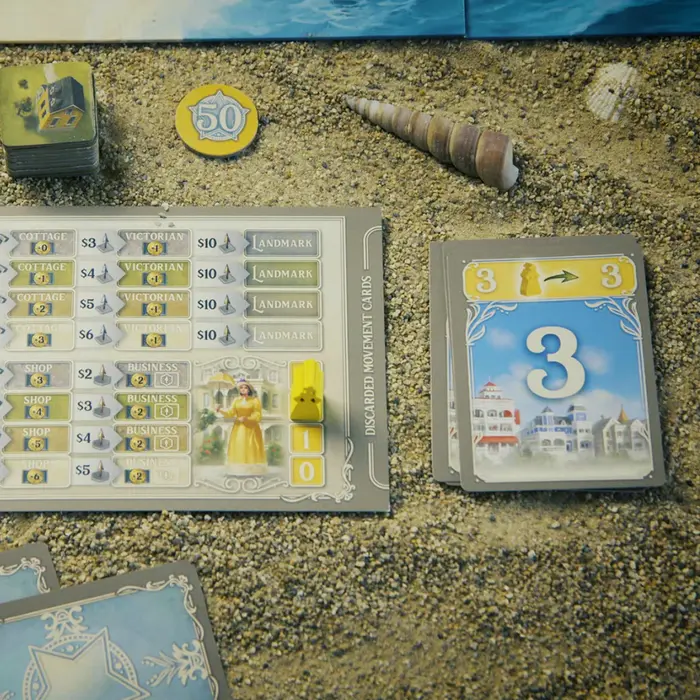My favorite themes in games are pretty easy to capture: horror, nature, art. But sometimes a game has a theme that speaks to me in much more esoteric ways. It grabs interests that I’d never expect in a hundred years to be grabbed on the tabletop. And that’s Cape May by Thunderworks Games, a title I finally got the chance to check out only recently. It combines my love for Victorian houses, Philadelphia, and old Americana in a way that’s so specific you’d think it’d be targeted. Plus my mom’s a lifelong Lighthouse fan so once I saw that cover I knew I had to try it out. So let’s enter the time machine and go back to a time when people actually went to the beach in New Jersey and wore long, heavy wool dresses to do so with Cape May.
What’s In The Box?

- 85 Plastic Miniatures (32 Victorian, 32 Business, 20 Landmark bases, 1 Lighthouse)
- 80 Cottage and Shop Tokens
- 60 Bird Tokens
- 60 Money Tokens
- 161 Cards
- 8 Wood Meeples
- 1 Double-sided Gameboard
- 1 Rulebook
The visual look of this game really drew me in and I love everything about it. It’s not cartoony or old-timey and takes clear inspiration from the seaside postcards of the time with its bright colors and painterly feel. The best part, though, is the little plastic minis that capture the elegance of a Victorian mansion in miniature and the Lighthouse, which tracks your rounds and is very much a “centerpiece” for the whole game.
How’s It Play?

The game is themed around the real-world town of Cape May, New Jersey, a seaside resort in the old Victorian way. It was one of the most popular ways for the people living in the industry choked cities of the area, especially Philadelphia, to get away from it and enjoy the fortifying sea air. Players are property developers working to build up the resort by buying land, building homes and shops, and getting as much prestige as possible over the course of four seasons.
Your turn is based around which three actions you want to take after the event card (which can be good or bad depending). With these actions you can:
- Move: Movement around the board is not dictated by dice, but by cards. This makes it easier to plan your moves ahead of time, but also makes that planning vital so you don’t miss out on an opportunity from lack of movement. Movement also allows you to land on some of the special spaces. Bird spaces add your bird tokens, which are worth prestige, while Lighthouse spaces let you build something wherever you like for $5. And Pier spaces let you draw Activity cards.
- Retrieve movement cards.
- Build: This is the basic core of the game, with you putting up cottages or shops around. What material you build your houses on and what your buildings are adjacent to are both vital parts of the decision making. These properties are the cornerstones of your income.
- Upgrade: This is where you can turn a cottage into a beautiful Victorian, make a Victorian a landmark, or turn a shop into a business. These help raise your incomes, though they do have upfront costs based on the zone. Upgraded businesses get you a special bonus that could go into affect permanently, for just one round, at the end of the game, or just once.
- Draw Activity Cards
- Play Activity Cards: Activity cards are a bit more “random” than your standard actions but do offer more opportunities that can build on previous turns. You could be building or upgrading, moving, or even doing that action multiple times. Some cards even give you discounts on your builds.
- Collect money: Get $3
The game ends after twelve rounds and then scoring occurs, which is dictated by how much was built and upgraded, where they were located, etc.

Solo mode is a pretty fun challenge and even comes with different difficulty levels. In solo mode, your side of play doesn’t really change much. But your opponent is Ava, a grumpy and ambitious sort who doesn’t so much want to build intelligently as much as she wants to kick your ass at real estate. She’ll move, build, and upgrade as dictated by her cards and tracks. The harder the difficulty, the more aggressive she is. She builds for what’s available and has no limitation of location, so you have to be careful that she doesn’t snipe you of the best locations. It’s a pretty basic solo “brain” but it’s also quite uncomplicated and a good challenge.
The Verdict?
If you’re the type of person who enjoys city management games but don’t want to get too deep into the weeds of modern municipal planning, Cape May is a much more laid back, genteel way to scratch that itch. You’re still building houses, still running businesses…but it’s almost polite in its way. You get this “oh terribly sorry you didn’t get this space, old sport” vibe from it, there’s not quite as many “gotcha” opportunities as similar games. You’re never truly boxed out and there’s plenty of events, activities, and more to help level things compared to Mr. Monopoly and friends. As a solo game it’s just something you can enjoy playing on a sunny afternoon, trying to get your best city planned and making the most of the little taste of the past offered in board game form. Truly delightful and something worth checking out if you get the chance.
You can grab Cape May direct from Thunderworks, from Amazon, or at your FLGS for an MSRP of $59.95 (but it’s currently on sale for $30).
Images and review copy via Thunderworks Games
Have strong thoughts about this piece you need to share? Or maybe there’s something else on your mind you’re wanting to talk about with fellow Fandomentals? Head on over to our Community server to join in the conversation!

